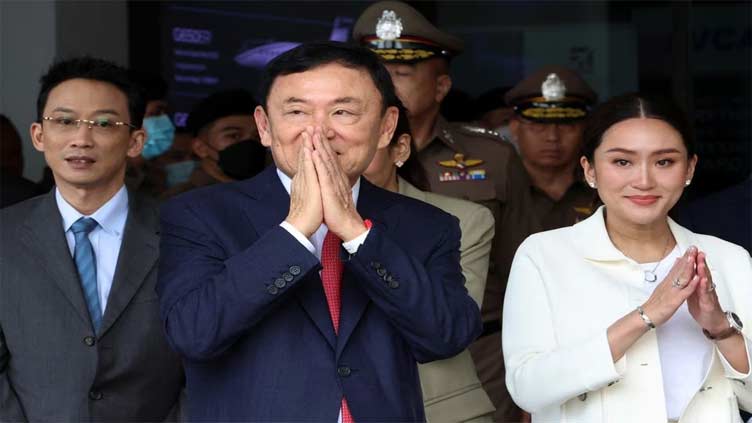Thailand's fugitive ex-PM Thaksin returns from 17 years in self-exile

World
Thailand has been under a caretaker government since March
BANGKOK (Reuters) - Thailand's fugitive former premier, Thaksin Shinawatra, returned on Tuesday from 17 years in exile, a historic homecoming that coincides with a bid by his political allies to form a new government with some of its biggest rivals.
Thaksin, 74, arguably Thailand's most famous politician and the fugitive figurehead of the populist movement Pheu Thai, appeared briefly with family members at Bangkok's Don Mueang airport to greet lawmakers, smiling and waving to hundreds of ecstatic supporters, before returning to the terminal.
/cloudfront-us-east-2.images.arcpublishing.com/reuters/U5HHWCUYSZOONGBA44U2HSBPRY.jpg)
On a social media post earlier as he boarded his plane in Singapore, his sister Yingluck said the "the day my brother has waited for has arrived".
"For the past 17 years, you feel isolated, lonely, troubled and missing home but you persevered," Yingluck, who also lives in self-exile, said in the post.
Thaksin fled abroad in 2008 to avoid a jail sentence for abuse of power, two years after the military toppled him alleging corruption and disloyalty to the monarchy, which he has vehemently refuted.
Police said he would be arrested and taken directly to the Supreme Court for a hearing, before being transferred to a prison.
Thaksin's arrival came as the lower house and military-appointed Senate was convening to vote on prime ministerial candidate Srettha Thavisin, a real estate mogul thrust into politics by Pheu Thai just a few months ago.
"Congratulations to the Shinawatra family and former PM Thaksin. Returning to your place of birth with your family, there is no greater happiness," Srettha posted on social media platform X, formerly Twitter.
/cloudfront-us-east-2.images.arcpublishing.com/reuters/C6UJ5MCALBNDBPZGF2HH2VLV74.jpg)
Thailand has been under a caretaker government since March and its new parliament has been deadlocked for weeks after anti-establishment election winners Move Forward were blocked by conservative lawmakers, leaving heavyweight Pheu Thai to lead a new effort.
The winner of five elections over the past two decades, Pheu Thai, a political juggernaut founded by the billionaire Shinawatra family, has agreed a contentious alliance including two parties backed by a military that overthrew governments led by Thaksin and sister Yingluck in coups in 2006 and 2014.
Srettha, 60, on Monday said Pheu Thai had failed to secure the outright majority it had targeted in the May election, so its only chance of governing was in partnership with some rivals it had vowed not to work with.
/cloudfront-us-east-2.images.arcpublishing.com/reuters/NOSKH236MVISFG3JCQZWD47W2E.jpg)
"We are not lying to the people, but we have to be realistic," said Srettha, who has the support of 317 lawmakers and needs 58 votes from the Senate to secure the requisite backing of half of the legislature.
LOVED AND LOATHED
The return of Thaksin, who is loved and loathed in equal measures in Thailand, is almost certain to overshadow that vote.
A former policeman, telecoms tycoon and English Premier League football club owner, Thaksin won the hearts of millions of working-class Thais with populist giveaways ranging from cash handouts and village loans to farm subsidies and universal healthcare.
But his popularity and his support for a new wave of capitalist upstarts put him at odds with a nexus of royalists, military and old money families, triggering an intractable power struggle that is still being played out today.
Thaksin maintains all charges and allegations against him were trumped up to keep him from power and has over the years repeatedly promised to make his return.
Thaksin was determined and confident to follow through this time, however, with widespread speculation that Pheu Thai's alliance with its enemies is part of a behind-the-scenes deal Thaksin may have struck to allow his return.
Pheu Thai has denied Thaksin's involvement in its bid to form a government and the former leader has for months denied conspiring with the generals who toppled him and his sister.

